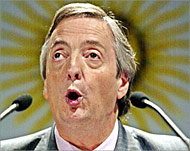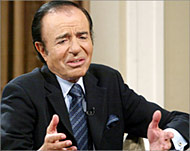Argentina gets president by default
Nestor Kirchner has become Argentina’s next president by default after former president Carlos Menem quit the electoral run-off between the two.
 |
| Kirchner: president sooner than predicted by polls |
The initial presidential elections on 27 April failed to produce a clear winner, and the run-off had been planned for 18 May. But the electoral court has approved Menem’s withdrawl, leaving the governor of Patagonia with the presidency.
The 72 years old Menem justified backing out by saying the conditions were not right for him to take part in the runoff.
Cutting remarks
“Kirchner can stick with his 22 percent and I’ll stick with the Argentine people,” said Menem in his hometown of La Rioja. In the first round of votes, he took 24 percent of the vote.
His successful rival, the 53 years old governor of the Patagonian province of Santa Cruz, was far from happy over Menem’s decision to pull out of the race only days ahead of Sunday’s planned run-off election.
“This is an unprecedented attempt by an ex-president, who cannot succeed in getting elected for a third term, to ruin everything without consideration to the damage he inflicts,” said the new president.
With opinion polls giving him over 60 percent support and a lead of more than 30 points over his only rival, Kirchner evidently banked on a landslide win to give him a strong mandate that could be crucial as he confronts Argentina’s deep-rooted economic crisis.
On Thursday, however, the Argentine Noticias newsweekly still called him “the man nobody knows.”
Limited time
Kirchner will have little time to put together his government as caretaker President Eduardo Duhalde, named by Congress in January 2002 after the loss of two presidents in one week, hands over power on May 25 in a lightning transition.
 |
| Menem pulls out four days before the run-off election |
Kirchner has said he would retain Economy Minister Roberto Lavagna, who has fought off the threat of hyperinflation. The new president has also gained respect for his administration of Santa Cruz, where he managed to keep unemployment below three percent, as compared with the national rate of 25 percent.
“I am going to fight for Argentina … We will combat poverty hard,” Kirchner said.
Fighting Poverty
Kirchner faces a massive task of leading Argentina, a nation of 36 million people who last year suffered terrible economic hardships.
In December 2001, Argentina defaulted on part of its $ 141 billion sovereign debt and the decade-old peso-dollar parity was abandoned in January 2002. Tough banking restrictions were imposed and even private bank accounts were frozen.
He also has three months to coax a new debt deal out of the International Monetry Fund after a stop-gap accord struck by Duhalde’s government runs out in August.
He will spend the next 10 days deciding the rest of his future cabinet and plans to return to his remote province of Santa Cruz to wrap up his governorship there.
Ordinary Argentines will hope that Kirchner succeeds.
“I don’t know what is going to happen,” said singer Laura Martorel, 32, noting Kirchner’s 22 percent first round support. “The truth is that I’m expecting a baby and am worried. Things here are bad.”